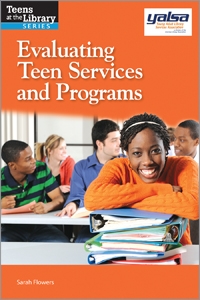Primary tabs
You don't need to be an ALA Member to purchase from the ALA Store, but you'll be asked to create an online account/profile during the checkout to proceed. This Web Account is for both Members and non-Members.
If you are Tax-Exempt, please verify that your account is currently set up as exempt before placing your order, as our new fulfillment center will need current documentation. Learn how to verify here.
- Description
- Table of Contents
- About the authors
Flowers offers guidance for librarians in examining all aspects of teen programming and services to determine where improvement is needed. Readers will learn how to
- Develop goals and objectives for evaluation
- Collect the data for a realistic picture of a library's strengths and weaknesses
- Use many different types of data with the help of practical examples included in the text
- Evaluate YA collections, summer reading programs, special events, and library staff
This guide comes with an explanation of the YALSA competencies, the YALSA teen services evaluation tool, and models for what excellent teen services programs should look like. Ready-to-use evaluation forms and checklists save time and resources by improving assessment methods in minutes.
List of IllustrationsForeword by Michele Gorman Preface Acknowledgments Chapter 1. Background and Theory Adolescent DevelopmentMillennials Serving Diverse TeensInformation-Seeking Behavior Developmental Assets Youth ParticipationThe Whole Library Experience References Chapter 2. Planning Developing Effective Goals and Objectives Outcome Measures Collecting Data: Types and Sources
- User Data
- Usage Data
- Policies and Procedures
- Program Data
- Budget Data
- Facilities Data
- Function Data
- Staffing Data
Finding Data References Chapter 3. Implementation Raw Data: What Does It Mean?
- Statistical Data
- Evaluating Policies and Procedures
- Competencies
Using Data to Make Changes
- Changing Policies
Using Data to Support Your Case Using Data to Plan for the Future References Chapter 4. Evaluation Evaluation as a Decision-Making and Communication ToolOutcome-Based Evaluation Evaluating YA CollectionsEvaluating Teen Summer Reading ProgramsEvaluating Teen Programs and Special Events
- Informal Evaluations
- Formal Evaluations
- Focus Groups
Evaluating Staff References Chapter 5. Best Practices What an Excellent Teen Services Program Looks Like Using the YALSA CompetenciesUsing the YALSA Teen Services Evaluation Tool
- How Library Administrators Can Use the Evaluation Tool
- How Trustees and Governing Bodies Can Use the Evaluation Tool
- How Library Patrons and Community Members
- Can Use the Evaluation Tool
- How Library and Information Science Faculty
- Can Use the Evaluation Tool
- How Teen Services Librarians Can Use the Evaluation Tool
References Chapter 6. References and Resource Guide Links and Books Sample Forms
- Needs Assessments
- Summer Reading Programs
- Program Evaluation
- Staff Evaluation
Checklists YALSA's Competencies and Evaluation Tool
- YALSA's Competencies for Librarians Serving Youth: Young Adults Deserve the Best
- YALSA Teen Services Evaluation Tool
References Index About the Author and YALSA
Sarah Flowers
Sarah Flowers recently retired as Deputy County Librarian for the Santa Clara County Library in California. She has written articles and reviews for Voice of Youth Advocates and School Library Journal, and is currently Editor-in-Chief of Young Adult Library Services, YALSA's quarterly journal. She was elected 2011-12 president of YALSA. She was a member of the first class of Library Journal's "Movers and Shakers," and was named one of the top 40 distinguished alumni of the San Jose State School of Library and Information Science. She has worked as a young adult librarian, a supervisor of adult and young adult services, and a community librarian as a branch manager.
Young Adult Library Services Association (YALSA)
The Young Adult Library Services Association (YALSA) is a national association of librarians, library workers and advocates whose mission is to expand and strengthen library services for teens, aged 12-18. Through its member-driven advocacy, research, and professional development initiatives, YALSA builds the capacity of libraries and library staff to engage, serve and empower teens.



